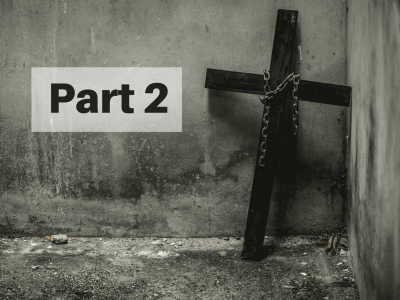Does the Bible Condone Slavery
Does the Bible Condone Slavery
This is a good question. In this week’s study, we are going to look into this question and see exactly what we can learn or “unlearn” of what we have been taught about this topic. Some have suggested that the idea of slavery came from the Bible and that the Bible actually supports this. So let’s put this question to the litmus test of Scripture and discover exactly what the truth is on this controversial topic.

“And as for your male and female slaves whom you may have from the nations that are around you, from them you may buy male and female slaves.” – Leviticus 25:44
From Scriptures like the one above, I can sure see the confusion and how one can believe the Bible supports slavery. But not everything is exactly what it appears on the surface. Let’s drill down on this topic and see if there is more there below the surface.
First of all, it will be interesting to learn that the word “slavery” in the original Hebrew does not exist. The word translated as slavery is actually the Hebrew word “ebed” which means servant and is translated as such almost 800 times in the KJV. Not once is it translated as slave. But that doesn’t mean that the concept of slavery did not exist back then. It certainly did and in many forms, as we shall see.
SERVANT OR SLAVE?
Ebed, comes from the three-letter child root word “abad”, which means “to work, labor or serve” and from the two-letter parent root “ab” which carries the idea of a “thick, dark cloud.” When someone is forced to become an ebed, it can certainly be a dark cloud over the life of that person for a period of time. We will come back to the thick, dark cloud in a moment. For now, let’s break all this down and see what this “ebed” is really all about in all its forms.
First of all, in order to understand these apparent difficult scriptures, one must first be familiar with ancient slavery and bondservant practices. In the ancient world, life was extremely difficult. It was mainly an agricultural society that was completely dependent on natural forces that were beyond its control, namely rain. Although there was definitely a wealthy class as well as a middle class, the poor were prevalent and in a constant state of need.
There were several different types of servants and several different ways that a person could become a servant. The two main groups of servants were Hebrew servants and Gentile servants and there were different rules designated in the Torah for each. One could become a servant in the ancient world either by being taken captive through war, being forced to sell oneself into being an ebed because of unpaid debt, being born from parents that were in the position of a slave, or if one was kidnapped he could be sold into slavery. In the ancient world, slavery and servitude were hard, laborious, and could be deadly, depending on how well they were treated by their masters. For this reason and more, Yahweh wanted to make it abundantly clear how the Israelites were to deal with this matter and what His Law would be on the subject. Where the rules for slavery and servitude were up to the individual master, this would not be the case with His people. The poor were always going to be there, there would always be people displaced by a war that would have no other way to survive outside of becoming servants and there would always be people that couldn’t pay their debts and had to “file for bankruptcy.” Contrary to the other gods of the nations, the Elohim (Judge and God) of Israel would make sure that those that fell into the ebed category had rights and were protected.
A HEBREW EBED
For instance, if one was a fellow Hebrew that came into hardship and was forced to become a servant in order to pay off his debt, that person was not allowed to be treated as an ebed, but as a hired servant, or in today’s vernacular–an employee (Lev 25:39). He is to work for his “employer” for six years and is to be set free during the seventh. During the Jubilee years, which were every 50 years, all Hebrew servants were set free no matter how long they had served (Lev 25:37-43). No Hebrew ebed could serve more than six years. Yahweh wanted to make sure that there was a system in place for Hebrews to pay off their debt and move on with their lives. Slavery among God’s people would not be tolerated.
The difference here in our employee analogy is that the one in this “employee” position does not get paid for his labor because he is paying off a debt that is owed. Whatever he came in with is what he goes out with. If he came in with his wife and children he may leave with them. If he came in by himself and then got married under his master’s roof, he may leave but his wife and any children that were born under servitude status must remain with the master due to the fact that they were born under his house and he provided for them. But if the servant wanted to stay with his family and loved his master, he could go before the judge and get his ear pierced, stating that he wanted to permanently stay in that status of a servant for his master (Ex 21:6). Yahweh put strict rules in place for servanthood for He did not want His people to ever be sold as slaves again (Lev 25:42).
A GENTILE EBED
If one was not a Hebrew and was either captured in war or chose to sell oneself due to financial reasons, the rules were different. There was no such shemitah or jubilee freedom for the ebed from another nation. A Hebrew could purchase an ebed from another nation and that person would be their property for life (Lev 25:45). But under no circumstances, regardless of whether the person was a Hebrew or a Gentile, the Israelites were not allowed to rule over anyone with severity (Lev 25:46). They were to treat all mankind with dignity and respect. Although the treatment of servants was largely dependent on the character of the master, there were strict regulations for the treatment of servants. For instance, if the master beat a slave or caused bodily injury to a servant, that servant would by Torah law be set free on account of his injury. This was not the case in foreign nations that had no such laws. For this very reason, many people of the surrounding nations that found themselves in dire straights and were forced to sell themselves into being an ebed, chose to come to Israel in order to do it. They knew that there were laws and rights that were afforded to them under the Hebrew God that didn’t exist in the other nations.
The difference between American and European slavery of days gone by and biblical slavery could not be more contrasted. First, the source of the slave trade in modern times was kidnapping people from their homes in foreign countries, a practice that is forbidden and condemned by Yahweh (Lev 25:16). The African people were not selling themselves to be slaves because they had no other way to survive. It was a system based on greed and pagan, evolutionary class warfare, declassifying certain people as being less than human so that they could live more luxurious lives.
On the contrary, the majority of the slave trade in Israel was due to a person selling themselves into slavery from falling on hard, financial times. As a matter of fact, without this system of servanthood, many families would be completely helpless and starve to death. This system afforded them the ability to either pay debts, survive, or both. For Hebrews, there was always light at the end of the tunnel with the law that one could only work for six years and everyone was set free during the Jubilee years. For the nations, many of the poor came to Israel to become servants due to the fact that they had more rights than any other nation.
This bondservant system was so prevalent in the ancient times and so understood as part of all the cultures, that the women would dress up in their finest clothes when their men went to battle, just in case they died, they would make themselves attractive to the winning soldiers. They knew that their physical lives were at stake and if they did not get chosen to be taken after the battle, they would likely die due to how harsh an environment was created in the wake of a war-torn village.
PROPHETIC CONNECTIONS
So how does all of this relate to the New Covenant and to us Believers today? It has a LOT to do with us and is pretty much the entire foundation of the New Covenant. How do you ask? Well, let’s make some connections. First of all, the servant position is based on debt. When one cannot pay his debt, he must sell himself into slavery. The Bible says that “The wages of sin is death, but the free gift of God is eternal life through Christ Jesus (Romans 6:23). We all owe a debt that we cannot pay. For all those that understand that and put themselves up on the auction block to be sold, Yeshua steps forward and pays the ransom price with his blood and brings them into His house. They are now His servants.
It’s hard being a servant on this earth, but because you are part of His family you only have to work for six years and then you are free. The six years is prophetically connected to the six days of work and the seventh-day rest and the six thousand years of human labor and then a millennium day of rest for the servants of the Lord. On that day, all the servants of Yahweh are set free from this earthbound system and are given new lives and new positions in the kingdom system. Meanwhile, just like the provision in the Torah, because we love our Master so much and He treats us with such kindness and provision, we choose to go before the judges to be “pierced” as He was, making an oath to serve Him forever in His house.
Also, the Gentile servants have few rights. Only those that are part of Israel have the right of true freedom in the coming Jubilee year. This is why there is no new covenant for the Gentiles. The New Covenant is only with the House of Israel and the House of Judah as Jeremiah 31:31 states. This is why Paul says that the Gentiles must be grafted into the Olive tree of Israel (Rom 11) and become part of the commonwealth of Israel and partakers of her promises (Eph 2). Without them becoming part of Israel, they cannot partake in these beautiful covenants of promise, one being the law of the bondservants.
THE DARK, THICK CLOUD
Remember the dark, thick cloud that I mentioned earlier as the Hebrew parent root word “ab?” We mentioned that when one has to sell themselves on the auction block because they can’t pay the debt that they owe, it is as if they are living under a dark, thick cloud. The beautiful thing about this Hebrew word picture is that dark, thick clouds are connected to blessing, covering, and the glory of Yahweh (Ex 19:9, Job 22:14). For those that are servants of the Most High, it may be tough and hot at times, but we are under the glory cloud of God. We are guaranteed rain for our labors because He is in the clouds and water is in His name. As a matter of fact, the Hebrew word for water is mayim and the word for heaven is shemayim. Shem is the word for name and mayim is water. Heaven is literally the place where water comes from the Name!
Lastly, since we are on the topic of word pictures, ebed is spelled ayin, beit, dalet. In ancient paleo pictograph Hebrew, where every letter was originally its own picture, ayin was an eye, beit meant house and dalet was an open door. When you put all of it together, you get “One who keeps their eye on the house is given an open door.” A true servant of Yahweh is focused on the House of God and in turn, the Father of the house opens the door. When we take the time to really focus on our own house, our own temple, and learn all we can from His, He will open doors that we thought were impossible to open.
I don’t know about you but I am grateful to be an eternal bondservant of Yahweh through His Son Yeshua. My ears are pierced with His Word and I am to listen intently to my Master’s voice. We have been bought with a price and paid for in full. I praise God that the Torah has not been abolished or the laws of a bondservant would not be in effect today. After all, it’s the very laws of the bondservant that allow me to be purchased to begin with!
Shalom,
Jim Staley

Jim Staley
About The Author
Jim’s life’s desire is to help believers everywhere draw closer to the Father by understanding the truth of the scriptures from their original cultural context (a Hebraic perspective) and to apply them in faith for today.











